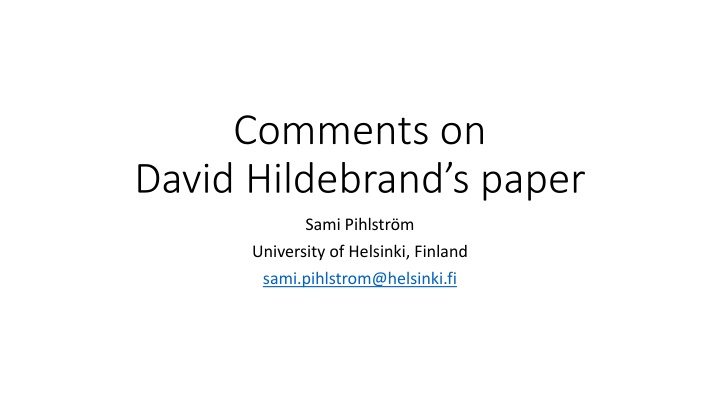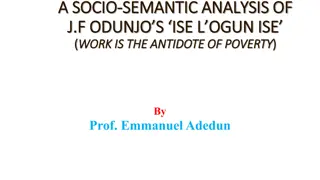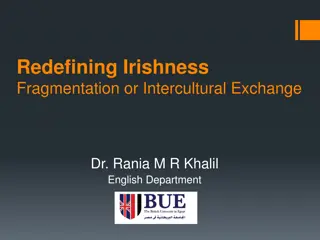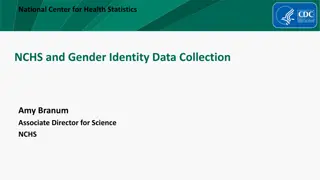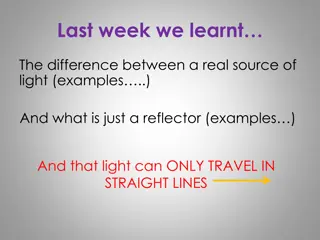Reflections on Values and Identity in Research by David Hildebrand: A Critical Analysis
Delve into thought-provoking questions raised by Sami Pihlström on David Hildebrand's paper, exploring themes such as the impact of changing fundamental values on personal identity, the concept of reflective equilibrium in research methodologies, the significance of core values, the interplay between moral and epistemic values in research, and the role of empathy in shaping inquiry.
Download Presentation

Please find below an Image/Link to download the presentation.
The content on the website is provided AS IS for your information and personal use only. It may not be sold, licensed, or shared on other websites without obtaining consent from the author.If you encounter any issues during the download, it is possible that the publisher has removed the file from their server.
You are allowed to download the files provided on this website for personal or commercial use, subject to the condition that they are used lawfully. All files are the property of their respective owners.
The content on the website is provided AS IS for your information and personal use only. It may not be sold, licensed, or shared on other websites without obtaining consent from the author.
E N D
Presentation Transcript
Comments on David Hildebrand s paper Sami Pihlstr m University of Helsinki, Finland sami.pihlstrom@helsinki.fi
I have five questions/comments to make: (1) Do we remain us if our fundamental values change? (2) Reflective equilibrium: theories, methods, aims? (3) Core values at the background? (4) Epistemic vs. moral constitutive vs. contextual? (5) Empathy?
1. Who are we? David emphasizes the constitutive sense in which our being who we are depends on our values . The tools we use (social, machine, linguistic) change our relationships, environment, habits, and values. However, as our values change, we change. But how much or how deeply can we change while still remaining who we are ( us )? Compare: Jonathan Lear (1998) on the disappearing we .
2. Reflective equilibrium Reflection on how we do research and the goals of our research: methods & aims. This sounds like what many philosophers have called reflective equilibrium constantly seeking and maintaining balance between values and method (of inquiry). In philosophy of science specifically, cf., e.g., Larry Laudan: mutual dependence between theories, methods, and aims/values. Compare, perhaps, Morton White s holistic pragmatism ?
3. Core values at the background I m (of course) tempted to reinterpret the background in Kantian- like (quasi-)transcendental terms: core values as necessary conditions for the possibility of us (or for remaining who we are)? Is it, then, necessarily a problem that value talk is (often) pushed to the background? (The background enables everything else.) It might also be good not to always talk about values, because value talk can be easily inflated. (Strategic lists of values, e.g., universities values.) All inquiries are rooted in a wider normative world. Yes but can this rootedness be given a quasi-Kantian transcendental characterization?
4. Moral vs. epistemic This brings me to the relation between moral and epistemic values. David says that research is permeated by values, both epistemic and moral yes, exactly. But he also says that epistemic values are constitutive while non-epistemic, or moral, values are (merely) contextual. Couldn t there be moral values that are constitutive of research? Aren t, e.g., patience and impartiality also moral, not merely epistemic, values? Moreover, could, e.g., democracy (in the Deweyan sense) be a constitutive value of inquiry transgressing the boundary between the moral and the epistemic? (Moral vs. epistemic: an unpragmatic dichotomy?)
5. Empathy We need empathy in order to inquire into moral issues yes. But we also need to be able to appreciate moral concerns that are independent of, and more fundamental than, what empathy can deliver. Moral duty cannot be reduced to relations of empathy. (Kant again.) Empathy may also lead us seriously astray in moral inquiry due to its partiality and contingency. Developing attentional habits in moral inquiry also requires that we are able to take seriously our moral obligations toward those with whom we cannot empathize at all.
Conclusion These are of course just suggestions, raising a few selected issues from the immensely rich paper David presented. Possibly, the fact that I m raising these particular issues rather than some others reflects our somewhat different emphases in pragmatism scholarship (and applications of pragmatism to our real- world problems today): should we go round Kant or through Kant (cf. William James)? But these differences are visible only against the background of profound and comprehensive pragmatist agreement.
